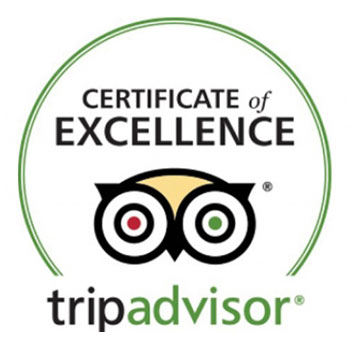Paying it Forward
Merideth Tall was born into a family of doers, creators, movers and shakers. Her grandfather Harry came from humble beginnings, emigrating to this country from Eastern Europe prior to WWI with a goal of starting his own luxury luggage line. After learning how to use an industrial sewing machine, Harry drove an oxcart all over the state, selling and tra
ding burlap sacks with farmers who were tanning their own leather and picking the best-quality hides for his designs. His hard work paid off when he and his brothers opened Tall’s Travel Shop in Seattle in 1917, where they sold Harry’s Travelux brand luggage.
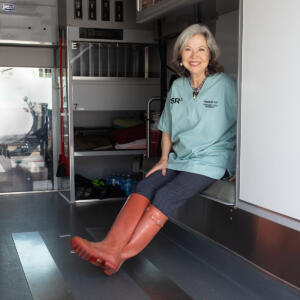
After Merideth’s dad, Leonard, returned from WWII, his instinct told him that cameras would be the wave of the future as they became more accessible and affordable to the layperson. He shared his idea with his dad, Harry, who believed in him and backed him. Harry sold his shares of Tall’s Travel Shop to his brothers and helped Leonard open Tall’s Camera Shop, which quickly became the largest camera-shop chain in the Pacific Northwest, ballooning to seven stores.
An optimist by nature and nurture, Merideth inherited that sense of ingenuity and strong work ethic from her dad and grandfather. At 10 years old she schmoozed her way into a summer job at the Overlake Blueberry Farm on Bellevue Way, where she picked 200 lbs. of blueberries for $20. She worked for her father for years, gleaning much from his entrepreneurial style. Merideth was raised to trust her gut instinct in a family with preternaturally spot-on gut instincts.
“My dad would involve me in his thought process,” says Merideth. “He was a good teacher. He would explain what needed to be achieved and how he was thinking about achieving it,” she continues. “He believed that you had to think about the problem in a different way—turning it until you figured it out.”
When Merideth was in her late-20s she (and then business partner, Phil Lepley) had their own big idea: a faster ferry service between Seattle and Victoria called the Victoria Clipper.
At the time, the only passenger ship that sailed between Seattle and Victoria was the Princess Margeurite, a luxury steamship that had been a fixture on the Seattle waterfront since 1925. By the 1980s “the Maggie” was a grand old dame that didn’t take reservations and traveled in a regal but slow style that no longer fit life’s modern pace.
Months of research went into the business plan for an aluminum catamaran powerful enough to navigate the difficult waters of the Strait of Juan de Fuca. The goal was to get funding here and have the catamaran built in Norway. Then reality hit. As a female entrepreneur in the 1980s, even with a male partner, no one was taking them seriously. “We would take the business plan to banks and all the banks told us why we couldn’t do it,” Merideth explains. “All of them.”
Eventually one lone bank expressed enthusiastic support but pulled out on the literal eve of their trip to Norway, leaving the partners with airplane tickets for the next morning but without funding for the boat. Despite that major setback, they went to Norway anyway. Merideth’s gut instinct was strong, and they trusted it. “I had such a powerful vision of what the company would look like, what that boat would look like,” she says. “It was just so real to me.”
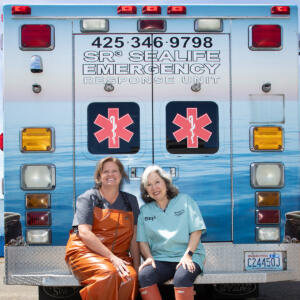
After finally securing a subsidy from the Norwegian government for most, but not all, of the seed money, Merideth made a late-night collect call to her dad from a pay phone in a parking lot in the middle of a Scandinavian winter to update him on the progress. Leonard, with full confidence in his daughter’s vision, funded the business the rest of the way. She hired him to work alongside her at the Clipper until his death in 1998.
That is what you call a pay-it-forward moment.
In addition to being a powerhouse businesswoman, Merideth is also a busy philanthropist, working tirelessly for causes that are important to her. She chaired the board of the Leukemia Society for 10 years; was the part-time board director at Interferry, an organization that supports safety and environmental regulations in the ferry industry; and helped found the Bellevue Fire Foundation in 2021 to expedite the needs of local firefighters.
In 2018, Merideth helped launch Sealife Response, Rehab and Research or SR3 (sealifer3.org), the only marine-mammal hospital of its kind in Washington and Oregon. SR3 was founded by executive director and veterinary nurse Casey Mclean to rescue seals, sea lions, sea turtles, harbor porpoises and sea otters that are sick or injured in local waters.
“I moved here in 2010 and assumed Washington had a facility like this,” Casey explains. “I was frustrated that we didn’t. These animals are impacted by human activities, not natural causes and are affected by changes in our waters, our food chain and our climate.”
SR3 opened the doors to its first, purpose-built facility at the marina in Des Moines, Washington, in 2021, and has since responded to 300-400 calls from the public each year. Zaratan, a lost and endangered loggerhead sea turtle, was a notable success story because turtles like her are rare here. After becoming hypothermic (too cold) and washing ashore in Oregon, Zaratan was rehabilitated and returned to the warmer waters of Southern California.
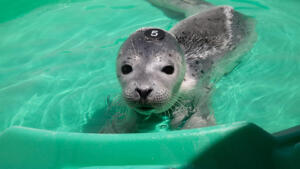
Seal pups are a more common patient in SR3’s care because seal moms often leave their pups on beaches giving well-meaning humans the idea that they’ve been abandoned. Usually, the pups are there to warm up, and it’s human interference that causes moms to abandon them. People who come across a lone seal pup are urged to stay at least 100 yards away for the safety of the animal. Community education like that is paramount to the organization’s mission.
In addition to the hospital, SR3 has a wildlife ambulance, which Casey has driven to and from Sausalito, California, a whopping 15 times to rescue and return injured sea mammals. SR3 is currently looking for a new ambulance to replace this trusty yet tired one and is also working with the city of Des Moines on a facility that would have room for education and outreach along with more space for larger species.
“SR3 is a great tie-in for Merideth,” Casey explains. “Her working career has been in the maritime industry and her expertise, time and support have been invaluable to us and is a testament to her commitment to our oceans.”
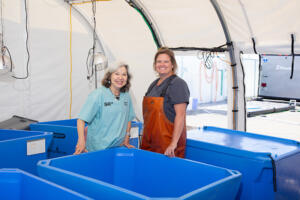
In her spare time, Merideth stays active—walking the Camino de Santiago in Spain, skiing in Sweden and standup paddle boarding in the summer. “She brings compassion and purpose to everything she does,” says BC personal trainer MaryAnn Carpenter. “Her unwavering commitment to her health and the people around her is a true inspiration.”
Merideth firmly believes in wellness and advocates that women stay strong and continue to build muscle as they age so they can remain vibrant and active. “It’s a wonderful life,” Merideth concludes, “but you’ve got to be strong to go live it.”





